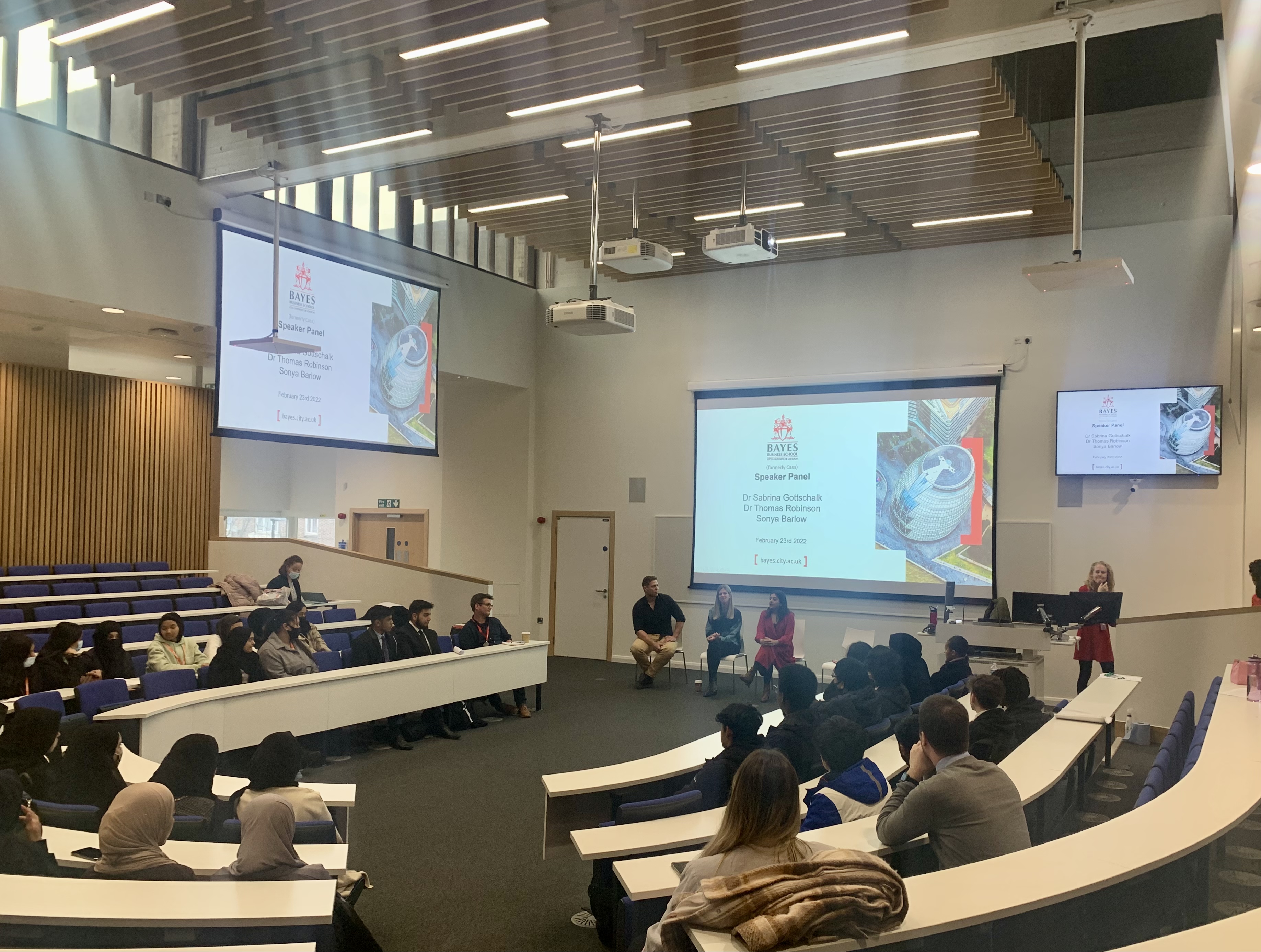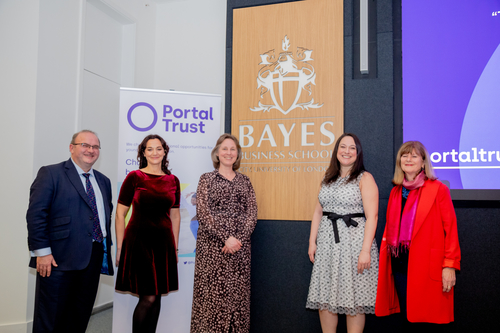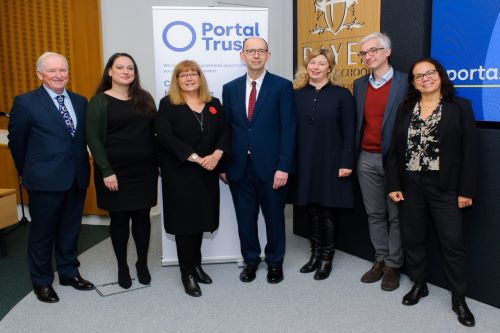Bayes Business School and The Portal Trust launch new report aiming to enhance social mobility and community engagement between schools and universities
Bayes Business School (formerly Cass) and The Portal Trust have released a new longitudinal impact report that shows how business schools can complement their curricula with the teaching of professional and social skills to engage with external stakeholders and local communities.
The School Engagement Project (SEP) was set up between the business school and educational charity in 2016, with the aim of developing a new way of collaborating with local schools by fostering social mobility and community engagement, while enhancing employability skills of undergraduate students. Primary objectives of the programme include building external partnerships with schools to demonstrate civic commitment to local communities; supporting recruitment of students from local communities into the business to raise aspirations; giving greater and more effective support to first-year university students at risk of dropping out; and developing skills that are highly valued by employers.
As part of the programme, the ‘Mentoring and Coaching for Leadership’ elective module is available to Bayes business management, accounting and finance and actuarial science students. Law, sociology and music students in other schools at City, University of London are also able to select the module.
The module provides safeguarding workshops before matching students with local sixth formers and first-year university students at risk of dropping out, for a term of weekly mentoring sessions.
The engagement report, titled Boosting Aspiration Through Near Peer Mentoring on the Curriculum, reflects on the significant progress that has been made in the eight years since the project was launched.
Summary findings and recommendations for key stakeholders from the report include:
- Funders should examine how they can replicate SEP’s novel collaborative matched funding model with other Higher Education Institutions (HEIs) and programmes to best support their beneficiaries.
- Business schools should explore how full-time academics with a background in coaching can contribute to better supporting students from disadvantaged backgrounds through SEP and similar programmes.
- Secondary schools should seize the opportunity to connect their careers provision and engagement with higher education to raise pupils’ aspirations.
- Non-governmental organisations (NGOs) and the Government should consider whether similar programmes can be initiated among their own networks and institutions to advance social mobility.
- City, University of London should investigate how it can embed SEP across all its schools to enhance learning and support the Civic Engagement Strategy.
The report also considers how SEP has evolved over time and how the experience from working with school pupils in underprivileged areas of London was transferred to similar work with first-year university students at risk of dropping out.
To date, 1,090 mentors and mentees have benefitted from the programme across a total of six schools from disadvantaged communities.
The report was formally launched on Wednesday 28 February at Bayes Business School, with Paul Palmer, Professor of Voluntary Sector Management at Bayes joined by a panel of alumni mentors from the programme and experts from further and higher education. Dame Julia Cleverdon, Vice Patron of Teach First and former CEO of Business in the Community, delivered a guest speech endorsing the partnership programme, championing the power of mentoring and encouraging delegates to share the report and best practices detailed within.
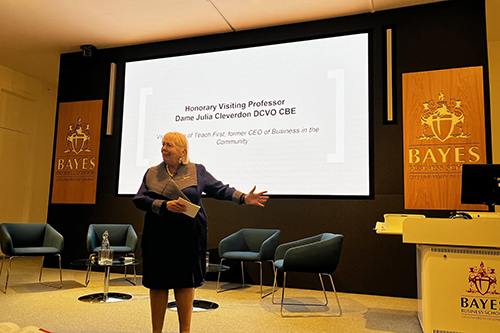
Professor André Spicer, Dean, Bayes Business School, said:
“We are delighted to launch this impact report with The Portal Trust, which demonstrates how a business school can successfully integrate peer-mentoring skills into its curriculum for the benefit of the community.
“The School Engagement Project started in 2016 to connect disadvantaged pupils and build their esteem and aspirations. This has evolved into a 15-credit elective module at Bayes where students are taught about safeguarding and develop mentoring skills, before being matched with either a Year 12 or first-year university student to gain a real-life mentoring experience.
“In the space of eight years, the programme has proved to be a shining light for the power that coaching can have on young people, while at the same time developing the confidence and key skills of our students. It is a true reflection of our guiding principles of We Care, We Learn, We Act, and we are looking forward to seeing the project continuing to grow.”
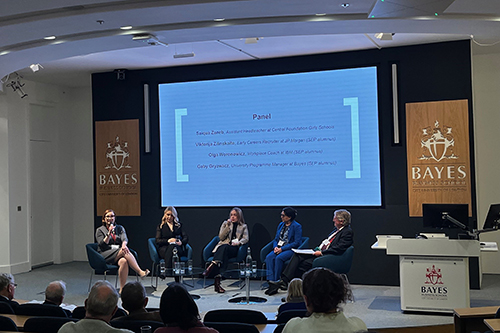
Richard Foley, Chief Executive, The Portal Trust, said:
“We’re proud to collaborate with Bayes Business School to demonstrate how near peer-mentoring can be used to foster community engagement and support the holistic development of young people.
“The launch of this new Impact Report is a celebration of our eight-year partnership that showcases the importance of having near peer-mentoring on the curriculum in business schools.
“The Schools Engagement Project has had a transformational impact on the young people who have taken part since its launch in 2016 by boosting aspiration, employability, and social mobility. We hope the recommendations made by the report encourage other business schools to use near peer-mentoring as a way of encouraging social mobility and creating more life-changing opportunities for young people.”
Download the full Boosting Aspiration Through Near Peer Mentoring on the Curriculum report.
Featured Bayes Experts
-
Professor of Voluntary Sector Management, Associate Dean and Director of Centre for Charity Effectiveness



